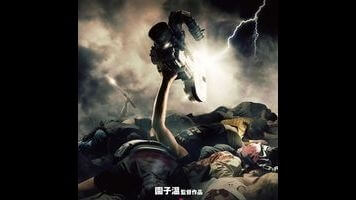Why Don’t You Play In Hell? invites you to a madcap cinematic playground

A self-conscious ode to filmmaking as orgiastic gonzo spectacle, Why Don’t You Play In Hell? takes its single joke to the exhausting extreme. Overflowing with crazy meta antics, Shion Sono’s comedy is a sprawling affair, though its nominal focus is Hirata (Hiroki Hasegawa), an aspiring director who’s intent on making a masterpiece with his film club, “The Fuck Bombers.” That dream isn’t realized until 10 years after the story’s start, and on the heels of a lengthy setup involving a feud between the rival clans of yakuza bosses Muto (Jun Kunimura) and Ikegami (Shin’ichi Tsutsumi). Their war led to the incarceration of Muto’s wife, Shizue (Tomochika), and the cancellation of the TV toothpaste commercial that made Muto’s daughter, Mitsuko (Fumi Nikaidô), a brief pop-culture star. On the eve of Shizue’s release from her decade-long prison stint, Muto endeavors to get disobedient Mitsuko a starring role in order to impress his wife—thus initiating a roundabout tale that Sono, leaving no stylistic gimmick unused, helms with unbridled zaniness.
From sudden zooms and abrupt freeze frames to lengthy tracking shots, slow-motion, and CG-enhanced fantasy interludes, Why Don’t You Play In Hell? boasts an aesthetic insanity to match its uninhibited narrative. That go-for-broke spirit enlivens Sono’s film, which, when not indulging in wild violence, also concerns itself with issues of cinematic representation, history, and preservation, the latter via repeated proclamations about celluloid’s superiority to video. Unfortunately, even as it embraces movies’ past (for example, via a yellow Bruce Lee jumpsuit), the script is such a drawn-out affair that comedic momentum is occasionally sabotaged by protracted scenes that are either wholly unnecessary and/or drearily one-note. Not knowing when to say when, the director piles on rampant gore and slapstick humor to a sometimes wearisome extent, and his cast assumes an across-the-board hysterical performance mode that frequently turns the action strident.
Nonetheless, even when it’s trying one’s patience with throwaway gags or bits of over-the-top brutality, Why Don’t You Play In Hell? is a rather canny celebration of the very type of no-holds-barred cinema that it’s peddling. In the film’s funniest moment, Hirata—having now been tasked with directing Muto’s self-financed movie, through a sequence of events too convoluted to properly recount here—bursts into Ikegami’s stronghold and begins filming a brawl, much to Ikegami’s chagrin, who laments the fact that his men look far worse on camera than Muto’s thugs, because, “We’re realists while they’re fantasists!” For Sono, the more outrageous, the better, an ethos that guides his material into ever more ridiculous territory, culminating with a lunatic set piece that’s part Day For Night, part Kill Bill, and all about the visceral thrills of fast, bloody, old-school cinema.